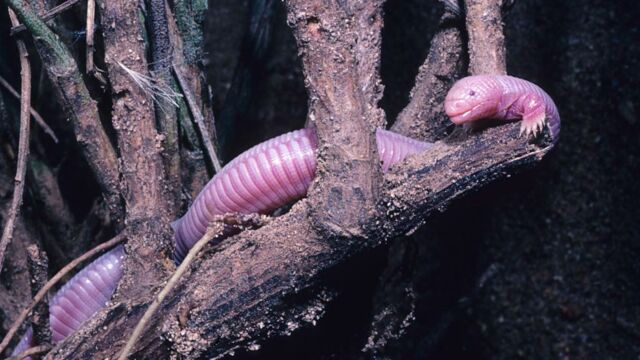Strange worm-like creature with 'hands' is actually something else

In Mexico, there is a pink animal that could easily be mistaken for an earthworm. It is, however, a reptile.
Nature is a fascinating aspect of Earth. Filled with all sorts of creatures, it is the home for millions of organisms. Some have been discovered by humans, however, there are many who have yet to reveal themselves. One such unusual creature is the ajolote lizard. This organism will leave you scratching your head, wondering whether it's a lizard or an earthworm.
Discover our latest podcast
A pink reptile
Despite its pink colour (sometimes leaning towards purple) and its elongated body, the ajolote lizard has absolutely nothing to do with the earthworm. This reptile looks like an earthworm, but the two animals are not at all the same species.
More under this adMore under this adIn addition to being a reptile, the ajolote lizard, or Bipes biporus as it is known scientifically, has a special feature: it has a pair of legs. Yes 'a pair', because this reptile has no lower limbs. To a certain extent, it can therefore be said to be an unlikely mixture of an earthworm and a T-Rex.
More under this adMore under this adA burrowing animal
The ajolote lizard is native to Mexico and measures about 20 centimetres. It is a burrowing animal, which means that it digs into the earth to live (like the earthworm) and find food. Moreover, it has a particular taste for insects and earthworms! As bioGraphic states:
While little is known about the Mexican mole lizard’s life history and behavior, the species’ abundance and the unusual niche it fills as an underground predator suggest that it’s a critical member of the region’s food webMore under this adMore under this ad
This article was translated from Gentside FR.
Sources used:
-bioGraphic: Bipes Aren’t Coming for You
Read more:
⋙ Giant bug-like creatures capable of devouring a fully grown alligator have been found in the ocean
⋙ Family discovered lost tortoise alive in the attic after 30 years
⋙ Super rare hummingbird thought to be extinct reemerges after 12 years